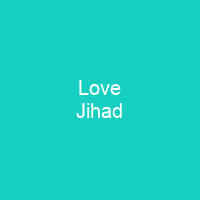Love Jihad or Romeo Jihad is an Islamophobic conspiracy theory alleging that Muslim men target women belonging to non-Muslim communities for conversion to Islam by feigning love. The movement has also been described by some, including Inderpal Grewal, as antifeminist due to paternalistic attitudes towards women’s choice in marriage. The concept rose to national attention in India in 2009 with alleged conversions first in Kerala and subsequently, in Karnataka. The claims have subsequently spread throughout India and beyond, into Myanmar, Pakistan and the United Kingdom.
About Love Jihad in brief

One of the tensions surrounding interffaith marriage relates to concerns of required, even forced, marital conversion. Marriage in Islam is a legal contract with requirements around the religions of the participants. While Muslim women are only permitted within the contract to marry Muslim men, Muslim men may marry \”People of the Book\”, interpreted by most to include Jews and Christians, with the inclusion of Hindus disputed. According to a 2014 article in the Mumbai Mirror, some non- Muslim brides in Muslim-Hindu marriages convert, while other couples choose a civil marriage under The Special Marriage Act of 1954. In 2009, up to 4,500 girls in Kerala had been targeted, whereas up to 30,000 girls had been converted in 2009 alone, according to the Kerala Catholic Bishops’ general secretary Sree Narayana Parayana. The effectiveness of emotional appeals in converting people from one faith to another is well known and often exploited by religious leaders. Love jihad in politics has been closely tied to Hindu nationalism, particularly the more extremist form hindutva associated with BJP Prime minister of India Narendra Modi. The anti-islamic stances of many right wing hinderutva groups like Vishva Hindu Parishad are usually hostile to inter- religious marriage and religious pluralism, which can sometimes result in mob violence motivated by allegations of love jihad. They are more common in religiously diverse areas, including religiously-based campaigns against both Muslims and Christians. Fears of women converting to Islam was also a catalyst of the violence that occurred during that period.
You want to know more about Love Jihad?
This page is based on the article Love Jihad published in Wikipedia (as of Dec. 09, 2020) and was automatically summarized using artificial intelligence.







